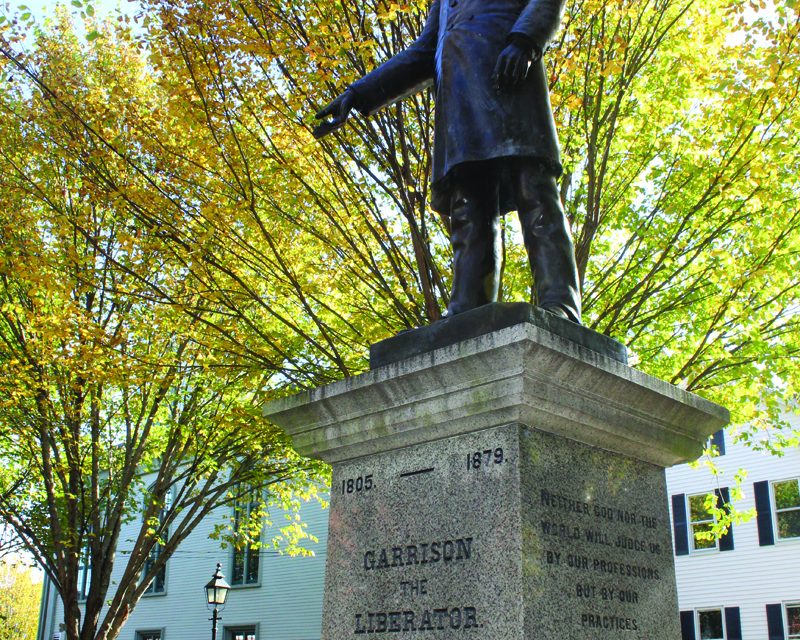NEWBURYPORT – William Lloyd Garrison, the outspoken abolitionist against slavery and one of this city’s most esteemed sons, would be pleased with the new interpretative sign being installed next week near his statue in Brown Square across the street from City Hall.
Entitled Grant Us Our Liberty, the bronze sign is part of the Newburyport Black Initiative, which highlights a largely unknown history of Newburyport. One of 10 signs planned for parks, the rail trail and downtown, it will tell the story of black activists who lived in the city during the 18th and 19th centuries.
The sign will be installed at 3 p.m., Dec. 5, during the week of the annual Garrison lecture, which will be held at 7 p.m., Saturday, Dec. 9, at the Old South Presbyterian Church.
Northeastern University Professor Kabria Baumgartner, who helped found the NBHI, will join Mayor Sean Reardon and Andrea Gaut Eigerman with the Friends of Garrison in speaking at the unveiling of the sign.
The purpose of the interpretive signs is to “Explore and amplify previously unacknowledged voices from the past, consider historical themes and storylines from new perspectives and enhance and inform Newburyport’s collective understanding of its past and contribute to a more inclusive history of our community,” said the city’s senior planner Geordie Vining.
As part of the festivities around Garrison’s birthday, Vining will deliver a half-hour lecture at 7 p.m. on Wednesday Dec. 6. His lecture, Expanding the Spotlight: Black Abolitionists from Newburyport in the Age of Garrison, will be held in the program room of the Newburyport Public Library, followed by a discussion.
Vining said earlier that the black history signage will “enhance the essential character of the city, enhance Newburyport’s National Historic Register District and serve a significant number of residents” who have not been given the recognition they deserve in this historic city.
The featured speaker at the annual Garrison lecture this year is Kerri Greenidge, the Mellon Associate Professor in the Department of Studies in Race, Colonialism and Diaspora at Tufts University. She also co-directs the African American Trail Project and is co-director of Tufts’ Slavery, Colonialism and Their Legacies Project.
Garrison was best known for his widely read anti-slavery newspaper The Liberator, which he founded in 1831 and published in Boston until slavery was abolished in 1865.
For his advocacy against slavery, Garrison had a price placed on his head. He was burned in effigy, and gallows were erected in front of his Boston office.
Later in life, Garrison became a leading advocate of women’s rights, which split the abolitionist community.
The Newburyport black activists, like Garrison, filed lawsuits, wrote editorials, organized protest groups and petitioned the government to end slavery.
In 1773, a Newburyport slave, Caesar Hendricks, sued his owner for “detaining him in slavery” and won damages imposed by an all-white jury.
Newburyport’s Caesar Sarter published an influential essay in 1774 in the Essex Journal and Merrimack Packet. Nancy Gardner Prince, born in Newburyport in 1799, became an abolitionist who gave public lectures in front of mixed audiences of men and women, a radical practice at the time.
The sign in Brown Square is the second the city has installed with the Newburyport Black History Initiative. The first stands alongside the Clipper City Rail Trail in honor of the predominantly black neighborhood, called Guinea.
A sign recognizing the Guinea neighborhood stands at the Low Street bridge on the Clipper City Rail Trail in the Auburn, Pond and Low Street area.
Additional signs are planned for Tracy Square, Inn Street, other downtown sites and at the Market Landing Park.
Contributing information on the city’s black history are the Museum of Old Newbury, the archival center of the public library, the historical commission, the Newburyport Preservation Trust and the Custom House Maritime Museum, plus independent historians and authors Marge Motes, Skip Motes and Ghlee Woodworth.
‘Grant Us Our Liberty’
Tuesday October 31, 2023

William Lloyd Garrison’s statue in Brown Square Photo by Stewart Lytle



